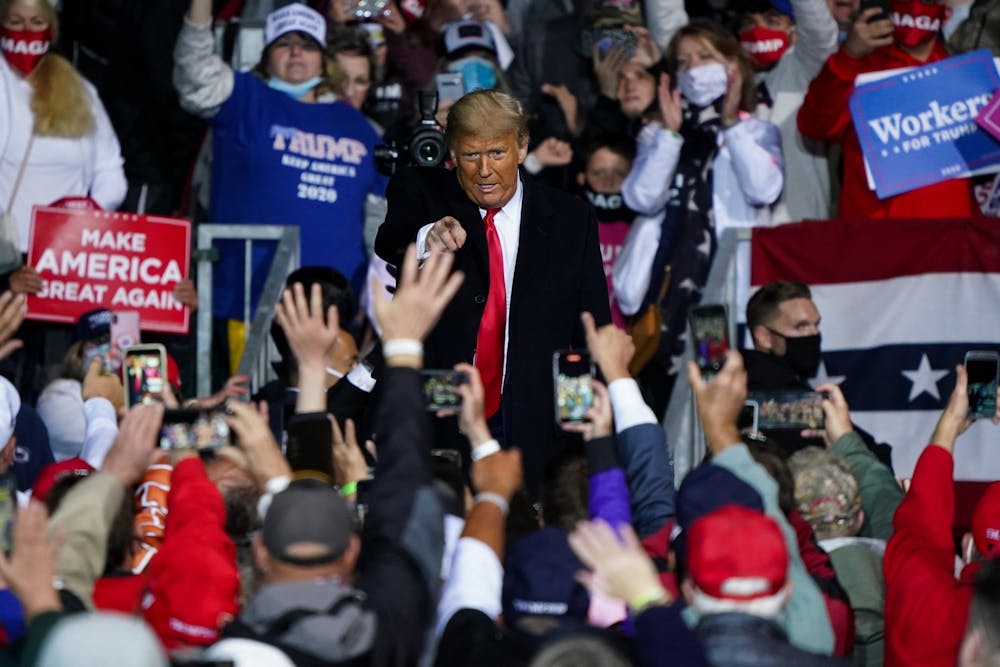The United States Senate voted to acquit 1968 Wharton graduate and former President Donald Trump in a historic second impeachment trial on Saturday evening.
The Senate voted 57-43 to acquit Trump, with seven Senate Republicans voting 'guilty' — in the most bipartisan margin in favor of conviction in American history — and all 50 Democrats voting to convict. The final vote count fell far short of the two-thirds majority needed to convict the former President, as most GOP senators chose not to cross party lines.
Trump released a statement after his acquittal in which he thanked his legal team and vowed to continue his movement “to make America great again,” without mentioning the Capitol insurrection.
Senate Minority Leader Sen. Mitch McConnell (R-Ky.) decided to vote not guilty, but in an email to Republican colleagues a few hours before the closing arguments in the Senate, McConnell said that the Senate had no power to remove an ex-president, citing a lack of jurisdiction. He publicly stated, however, that Trump had "provoked the attack."
Earlier Saturday, House managers made an abrupt demand to hear from witnesses during the trial. While the Senate voted to allow it — which would have prolonged the trial for days or weeks — the prospect was dropped by prosecutors. Trump’s defense team later agreed to add a written statement to the trial record by Rep. Jaime Herrera Beutler (R-Wa.).
Beutler's Feb. 12 statement indicated that she was told that Trump sided with the mob that attacked the Capitol, and said that House Minority Leader and Rep. Kevin McCarthy (R-Ca.) told her of a phone call he had with the former president while the attack was happening. McCarthy called Trump asking him "to publicly and forcefully call off the riot," to which Trump responded stating that "rioters are more upset about the election than you are." Her statement ended with a plea for former Vice President Mike Pence to share his account of the attack.
The House of Representatives impeached Trump on Jan. 13, just one week after he incited a deadly attack against the Capitol, which made him the only president in U.S. history to be impeached more than once. Unlike Trump's first impeachment, his second impeachment attracted more bipartisan support with representatives including third-ranking Republican Liz Cheney (R-Wyo.) and nine other Republicans voting in favor of the article.
The House had introduced and passed one article of impeachment, charging Trump with "incitement of insurrection." All 222 House Democrats as well as 10 House Republicans voted in favor of impeachment.
RELATED:
Penn’s failure to condemn Trump in statement on Capitol storming frustrates students, faculty
With Trump gone, Penn faculty and conservative students express uncertainty over GOP’s future
Trump’s second impeachment resulted from his incitement of an insurrectionary, right-wing mob's breaching of the U.S. Capitol on Jan. 6, which served as an attempt to overturn the results of the 2020 presidential election.
The speech Trump delivered to his supporters before they stormed the Capitol, in which he explicitly urged them to “be there, [and] be wild,” was key to House Democrats' article of impeachment against the President, according to The New York Times.
In December 2019, Trump was impeached for the first time after the House of Representatives charged him with abuse of power and obstruction of Congress. The President was accused of soliciting election assistance from the Ukrainian federal government to investigate former Penn Presidential Professor of Practice and President Joe Biden.
Trump is the third president to be impeached, following formers Presidents Andrew Johnson and Bill Clinton, who were both acquitted by the Senate. President Richard Nixon resigned from office before the House was able to vote on impeachment.
Following the Capitol riots, Penn President Amy Gutmann and Provost Wendell Pritchett condemned the insurrection but refused to explicitly denounce Trump’s actions or mention his self-touted connection to the University. Members of the Penn community continued to call on the University to disassociate from the President, and some alumni — already choosing to withhold donations to Penn in the wake of the Capitol mob — called for the revocation of Trump's undergraduate degree.









